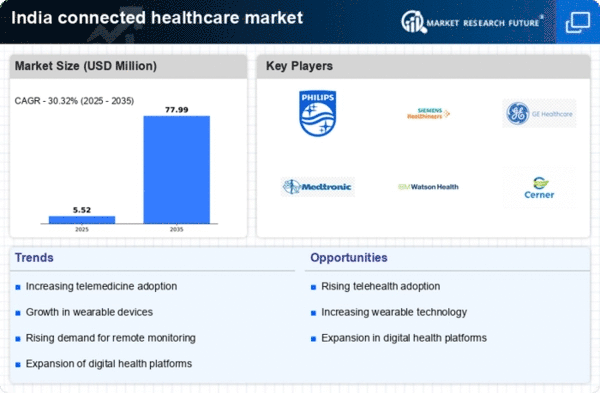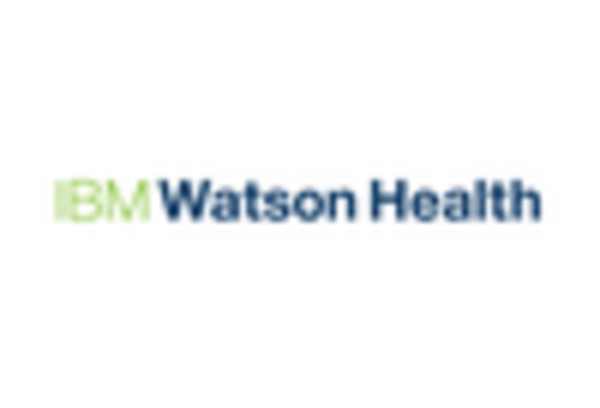Increased Smartphone Penetration
The rapid increase in smartphone penetration across India is a crucial driver for the connected healthcare market. As of November 2025, smartphone users in India are estimated to reach 800 million, providing a vast platform for health applications and services. This accessibility enables patients to engage with healthcare providers through telemedicine, access health information, and utilize wearable health technologies. The proliferation of mobile health applications is likely to enhance patient adherence to treatment plans and promote preventive healthcare measures. Consequently, the connected healthcare market is poised for significant expansion, with mobile health solutions becoming an integral part of everyday healthcare practices.
Government Initiatives and Support
The Indian government is actively promoting digital health initiatives, which significantly impact the connected healthcare market. Programs such as the National Digital Health Mission aim to create a robust digital health ecosystem, facilitating the integration of technology in healthcare delivery. By 2025, the government has allocated over $500 million to enhance telehealth services and digital infrastructure. These initiatives are designed to improve access to healthcare services, especially in rural areas, where traditional healthcare facilities may be lacking. The support from the government not only encourages innovation but also attracts investments in the connected healthcare market, fostering a conducive environment for growth and development.
Growing Focus on Preventive Healthcare
There is a notable shift towards preventive healthcare in India, which is significantly influencing the connected healthcare market. With rising healthcare costs and an increasing burden of diseases, both patients and providers are prioritizing preventive measures. This trend is reflected in the growing adoption of health monitoring devices and wellness applications. By 2025, the preventive healthcare segment is anticipated to account for over 40% of the connected healthcare market. This focus on prevention not only empowers individuals to take charge of their health but also reduces the overall healthcare expenditure. As a result, the connected healthcare market is likely to experience robust growth, driven by the demand for solutions that promote health and well-being.
Integration of Artificial Intelligence
The integration of artificial intelligence (AI) in healthcare is transforming the connected healthcare market in India. AI technologies are being utilized for predictive analytics, personalized medicine, and operational efficiency. By 2025, it is projected that AI applications in healthcare could generate savings of up to $10 billion annually. These advancements enable healthcare providers to analyze vast amounts of data, leading to improved patient outcomes and streamlined operations. The adoption of AI-driven solutions is likely to enhance diagnostic accuracy and treatment efficacy, thereby fostering trust in the connected healthcare market. As AI continues to evolve, its impact on healthcare delivery in India is expected to grow exponentially.
Rising Demand for Remote Patient Monitoring
The increasing prevalence of chronic diseases in India is driving the demand for remote patient monitoring solutions within the connected healthcare market. As of 2025, approximately 30% of the Indian population suffers from chronic conditions, necessitating continuous health monitoring. This trend is further fueled by the growing awareness of health management among patients and healthcare providers. Remote monitoring technologies enable real-time data collection and analysis, allowing healthcare professionals to make informed decisions. The connected healthcare market is expected to witness substantial growth, with projections indicating a market size of $2 million by 2026. This demand for remote monitoring solutions is likely to enhance patient engagement and improve health outcomes, thereby transforming the healthcare landscape in India.
















